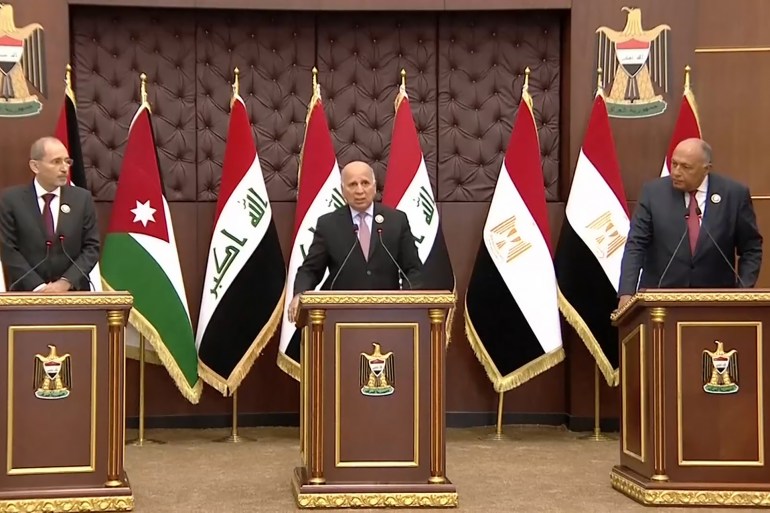A tripartite summit was launched in the Iraqi capital, Baghdad, that brought together Iraqi Prime Minister Mustafa Al-Kazemi, Egyptian President Abdel Fattah El-Sisi and Jordanian King Abdullah II.
In a speech during the summit, the Egyptian president stressed the necessity of "strengthening cooperation, especially with the unacceptable regional interventions that seek to dominate and threaten Arab security."
Al-Sisi affirmed the continuation of work to establish the cease-fire between the Palestinian and Israeli sides, and stressed the necessity of the exit of foreign forces from Libya and the respect of the ceasefire.
Mustafa Al-Kazemi received Abdel Fattah Al-Sisi in Baghdad today (Reuters)
common format
The tripartite summit aims to complement what was discussed in previous meetings that brought together the leaders of the three countries, in order to formulate a joint coordination mechanism.
Earlier in the day, Sisi arrived in Baghdad, becoming the first Egyptian president to visit Iraq since Saddam Hussein's invasion of Kuwait in 1990.
The conflict led to the suspension of diplomatic relations between Iraq and Egypt, but they have improved in recent years, as many senior officials of the two countries exchanged visits.
This fourth round of talks aims to enhance security, economic, trade and investment cooperation between the three Arab countries.
In recent years, Iraq signed cooperation agreements in the energy, health and education sectors with Jordan and Egypt.
The Jordanian monarch arrived in Baghdad shortly after Sisi's arrival, and was also received by Iraqi Prime Minister Mustafa Al-Kadhimi and Iraqi President Barham Salih.
Al-Kazemi, Al-Sisi and King Abdullah held a summit last year in Amman, and another summit was scheduled to be held in Baghdad last April, but it was postponed due to a train accident in Egypt that left dozens dead and wounded.
A joint press conference of the foreign ministers of Iraq (center), Jordan (left) and Egypt (right) today after the start of the tripartite summit (Al-Jazeera)
Bilateral cooperation agreements
In February, Egypt signed 15 agreements and memoranda of understanding in various sectors, including oil, roads, housing, construction and trade, after the Iraqi Council of Ministers agreed in December to renew the contract to supply the Egyptian General Petroleum Corporation with a total of 12 million barrels of Basra Light crude for the year 2021.
The Egyptian presidency said in a statement that Sisi "confirmed Egypt's aspiration to develop bilateral cooperation with Iraq into a sustainable framework of economic integration and strategic cooperation, especially in light of the great challenges facing the region, as well as the economic and social crises caused by the Corona pandemic."
Iraq also plans to build a pipeline aimed at exporting one million barrels per day of Iraqi crude from the southern city of Basra to the Jordanian port of Aqaba on the Red Sea.
Following brief talks between Barham Salih and Abdel Fattah al-Sisi after the latter arrived at Baghdad International Airport, Saleh stressed the importance of "raising the level of coordination" between the three countries and "developing prospects for cooperation in the economy, trade, development, infrastructure projects, energy transfer and oil."
Saleh also discussed with the Jordanian monarch ways to resolve crises and reduce tensions in the region, especially in Syria, Libya and Yemen, "with the aim of moving towards prospects for a political solution through convergence and dialogue," according to a statement by the Iraqi presidency.
Barham Salih (right) receiving King Abdullah II upon his arrival in Baghdad (Reuters)
economy and security
The statement added that the two sides discussed "joint coordination to confront the challenges of terrorism and extremism, the health and economic repercussions of the Corona epidemic, and the climate change crisis, which is a common threat that threatens everyone."
In turn, Al-Kazemi welcomed, in a tweet, this summit, considering that it establishes a "future worthy of our peoples."
At a similar summit in Jordan in August 2020, the three parties stressed "the importance of strengthening cooperation in economic and vital fields, such as electrical interconnection, energy projects and the joint economic zone" between them.
After that summit, Al-Kazemi headed to Washington, where he met former US President Donald Trump, in a meeting that was considered a third round of "strategic dialogue" between the two countries, followed by a reduction in the number of US forces in Iraq from 5,200 to 2,500 by January 2021.
Cairo and Amman are allies of the United States in the Middle East, and therefore this summit is seen as an attempt to bring Iraq closer to Washington and achieve a balance in its relationship with it, amid increasingly complex differences between it and Iran, which supports armed factions in Iraq, especially the affiliated militias. in the Iraqi official forces.

